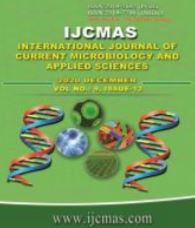


 National Academy of Agricultural Sciences (NAAS)
National Academy of Agricultural Sciences (NAAS)

|
PRINT ISSN : 2319-7692
Online ISSN : 2319-7706 Issues : 12 per year Publisher : Excellent Publishers Email : editorijcmas@gmail.com / submit@ijcmas.com Editor-in-chief: Dr.M.Prakash Index Copernicus ICV 2018: 95.39 NAAS RATING 2020: 5.38 |
Social and digital media facilitates effective communication by sharing ideas, thoughts and information through virtual networks among rural communities. Social media use by the farmers is inevitable and enhances them to interact with their neighboring community, officials, market, and other development agencies. NGOs, a major player in rural development and serves the objective to work with the community are harnessing the benefits of social and digital media by establishing strong relations with people and organizations. NGO’s explores various dimensions of social and digital media to interact with their beneficiaries. With this background, a study was conducted to explore the social and digital media initiatives for rural development with the dimensions of social and digital media utilization pattern, preferences of beneficiaries, perception about social media, type of information sought by rural people. The study was conducted by analyzing the activities of three reputed NGOs, viz., DHAN, MSSRF, and CEAD functioning in the U.T of Puducherry. The officials and beneficiaries of the NGOs were examined for this analysis. The results show that most NGOs use social media to share technical information related to crop production/animals husbandry followed by marketing information, weather, and training related information. The officials of NGOs and beneficiaries perceived that these media are beneficial for rural development. The important barriers expressed by them include language of message, digital literacy, cost of access data and connectivity. The suggestion offered by them includes training in ICT, internet speed, proper translation of messages in local language. The acceptance towards social and digital media is positive to a considerable utilization from the NGOs and farmers. The respondents admitted that social and digital are effectively transfer the information and technology, easy to operate, cover large number of farmers, ensures timeliness in access to send and receive information, an effective mechanism to manage the dearth of staff in NGO’s and cost effective. At contrast due to the education level of farmer/rural people, income, experience in handling ICT tools, social and digital media failed to be an effective teaching tool, convince rural people towards the information reliability, and reach farmers without discrimination.
 |
 |
 |
 |
 |